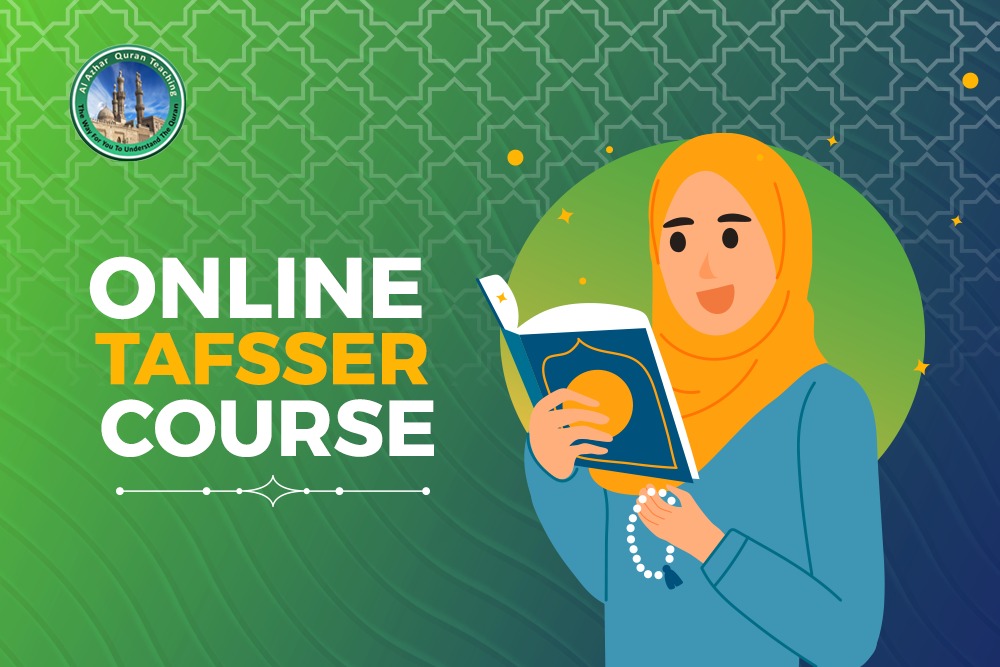Sure, I’d be delighted to talk about ONLINE tafsser course topics! Tafsser is an Arabic word that means “exegesis” or “interpretation” and refers to the study of the Quranic text and its meaning. Introduction to Quranic Arabic, the history of Quranic interpretation, different approaches to tafsser, and specific interpretations of specific verses or chapters of the Quran are some popular ONLINE tafsser course topics. Other possible topics include the role of tafsser in Islamic scholarship and theology, debates over contentious interpretations, and the evolution of tafsser over time. Overall, there are numerous intriguing ONLINE tafsser course topics that could be thoroughly explored!
I have no personal beliefs or opinions as an AI language model. Tafsir, on the other hand, is the interpretation and explanation of Quranic verses. It is regarded as a valuable tool for Muslims seeking to comprehend the meaning and context of the Quranic teachings. Tafsir assists in comprehending the historical context, linguistic nuances, and cultural context of Quranic verses. It also aids in deriving practical guidance for daily life from the Quranic teachings. As a result, Tafsir is extremely valuable to Muslims who want to learn more about Islam and its teachings.
Tafsir is a Quranic interpretation. Understanding the context in which the verses were revealed, analysing the language and grammar used in the verses, and taking into account the historical and cultural background of the time period are the main principles of tafsir. Tafsir also entails examining other Quranic verses that may provide additional insight into a particular verse, as well as consulting with Islamic scholars and experts. Furthermore, to properly interpret and apply Quranic teachings to contemporary issues, tafsir necessitates a thorough understanding of Islamic theology and jurisprudence.
Tafsir is the Arabic word for interpretation or exegesis of the Quran. It is a vital branch of Islamic studies that seeks to provide a more in-depth understanding of the Quranic text and its meanings. Tafsir’s main principles are as follows:
- Linguistic analysis entails looking at the Arabic language used in the Quran, including its grammar, syntax, and vocabulary.
- Historical context: Tafsir scholars look at the historical context of each verse, including events and circumstances that may have influenced its meaning.
- Literary analysis: Tafsir scholars examine the Quranic text’s literary style and structure, as well as its use of metaphor, symbolism, and other literary devices.
- Islamic belief consistency: Tafsir must be consistent with established Islamic beliefs and teachings.
The Arabic term for interpretation of the Quran is Tafsser. It is a complex and nuanced field that necessitates a thorough understanding of Islamic theology, history, and language. Tafsser must have the following characteristics in order to be understood:
- Understanding the Historical Context: Understanding the historical context in which the Quran was revealed is one of the most important features of Tafsser. This includes knowledge of the prevailing social, political, and cultural conditions.
Linguistic analysis is another important feature of Tafsser. Examining and comprehending the Arabic language used in the Quran.
- Interpretive Methods: Tafsser employs a variety of interpretive methods, including literal interpretation (which takes the text at face value).
As a talkative person, I’d like to discuss why we should learn Tafseer. Tafseer is the study of Quranic interpretation and understanding. It is an important aspect of Islamic education because it helps us understand the meaning and purpose of the Quran’s verses.
There are several reasons why we should learn Tafseer. For starters, it enables us to comprehend Allah’s message in a more profound and meaningful manner. The Quran is more than just a book of words; it is a guide for humanity that contains valuable lessons and guidance for our daily lives. By studying Tafseer, we can gain a better understanding of these lessons and apply them to our lives.
Tafsir:
Tafsir is derived from the root word fassara, which means to expound or explain. As a result, Tafsir of Quran refers to the explanations or interpretations of Quranic verses. Tafsir of the Quran is not something done by people with ordinary or common intellect and understanding of Islam; rather, it is done by people who have obtained extensive knowledge about Islam and have thoroughly read the history of Islam. The goal of a Tafsir is to discover the true meanings of Quranic verses so that the audience can benefit from it and understand the correct and true message of the Quran.
Online Quran Tafseer classes
Many Muslims who do not speak Arabic struggle to understand the true meaning of the Quran’s verses. Readers may fail to understand what Allah intends to convey through His words if they do not understand the context. They can gain a better understanding of each verse and its deeper meanings by taking Quran Tafseer classes online. They can learn about the various aspects and implications of each surah and ayat through these courses. They can learn more about the revelation that was revealed to Prophet Muhammad (PBUH) and how it relates to their lives today with this knowledge. Furthermore, learning Tafseer allows for greater spiritual growth and development because Muslims can fully appreciate why Allah has provided for us.
Flexibility in scheduling
Our online Quran Tafseer course is designed to work around your current obligations. There are three different course durations to choose from, each one tailored to a specific level of commitment and learning objective. Resala Academy has something for everyone, whether you want an intensive, all-encompassing experience or just a basic understanding of the subject.
Study Plans that are Structured
Our course was created with our students’ needs in mind. We provide structured study plans that are simple to implement and ensure that students make consistent progress towards their learning objectives. Each lesson will include activities, tests, and assignments that will allow you to apply your knowledge in a practical setting and really hone your Tafseer understanding.

